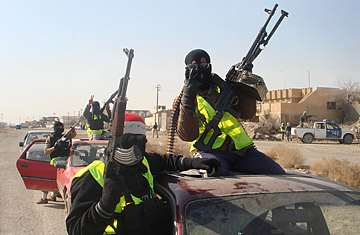
Members of the Awakening movement on patrol in August
Part 10 of TIME's Return to Baghdad series.
For American troops, especially those stationed around Baghdad, Fallujah and Ramadi were often mentioned in the same breath, the evil twin sisters of Anbar Province. And while the battles in Ramadi were smaller than those in Fallujah, the fighting was often equally vicious.
In late 2006, Ramadi became famous as the birthplace of the Sunni Awakening. According to the American narrative, enlightened U.S. commanders began co-opting insurgents and convincing them to stop fighting. But the true brilliance of this plan was that it didn't require the insurgents to lay down their weapons: they merely had to point them away from us and towards al-Qaeda.
Suddenly, groups of insurgents, some of whom had been battling the Americans for years, became known as Sons of Iraq and were paid $300 per month for their about face. The accepted truth among Americans is that the Sunni Awakening, combined with the 2007 troop surge, helped win the war.
But in the cluster of palm-studded villages called al-Hamdiyah on the outskirts of Ramadi, the story is a bit different. Here, Sheikh Abdel Jabbar al-Feydawi, the leader of the Albu Fahed tribe, sought revenge for his brother's murder by rallying his people to defeat al-Qaeda. According to him, he did so with little assistance from the Americans and took none of their reconstruction money.
The anti-al-Qaeda movement was just taking hold in Anbar when the American brass woke up and realized that the U.S. couldn't kill its way out of an insurgency. Money followed, although not to Feydawi. He told us that he refused to enroll his militia in the Sons of Iraq program and arranged for them to become actual policemen instead.
The results were stunning. Feydawi chauffeured us around the village in his Land Cruiser, a scene eerily familiar to our tour of Fallujah. The sheikh wore a grey suit with a silk lime green shirt instead of the traditional tribal dishdasha. Feydawi pointed out al-Qaeda safe houses and homes destroyed by either of his old enemies — al-Qaeda and the Americans. It would be impossible to tell the difference. Hamdiyah has seen the same building boom we saw in Fallujah, only with larger, fancier houses, making the farm hamlet look a bit like a gated suburb in South Florida.
In Hamdiyah, policemen maintain similar checkpoints as in Baghdad, but because the area is small and nearly everyone is from the same tribe, there's almost a small town feel to it all. Policemen stop and search cars but also greet people by name. They shake hands, kiss cheeks and then bump their right shoulders together. According to Bobby, the last is an old tribal greeting, but looks a bit like an awkward bro hug.
After leaving the area's al-Qaeda torture prison, which Bobby describes in his companion piece to this story, we drove past flocks of children leaving school. They were like busy flecks on the road as the older ones helped the younger ones, some barely bigger than their backpacks, find their way home.
The last stop on this tour was the floating bridge Feydawi had constructed to connect his side of the village to the other side of the Euphrates River. With vigilantly guarded checkpoints at each end, this prime terrorist target must be one of the safest places in Anbar province. At the far end, a member of the National Police greeted the sheikh while a sentry stood watch. The second policeman was outfitted in a hand-me-down American ballistic vest and mirrored sunglasses and was brandishing an American-made M16.
Earlier we met with two sheikhs who told us that it would be generations, if ever, before the people of Anbar could forgive the Americans for their actions here. But judging by the security situation, it looks like they don't mind a little American influence on their policeman, so long as the bridges remain unharmed.
